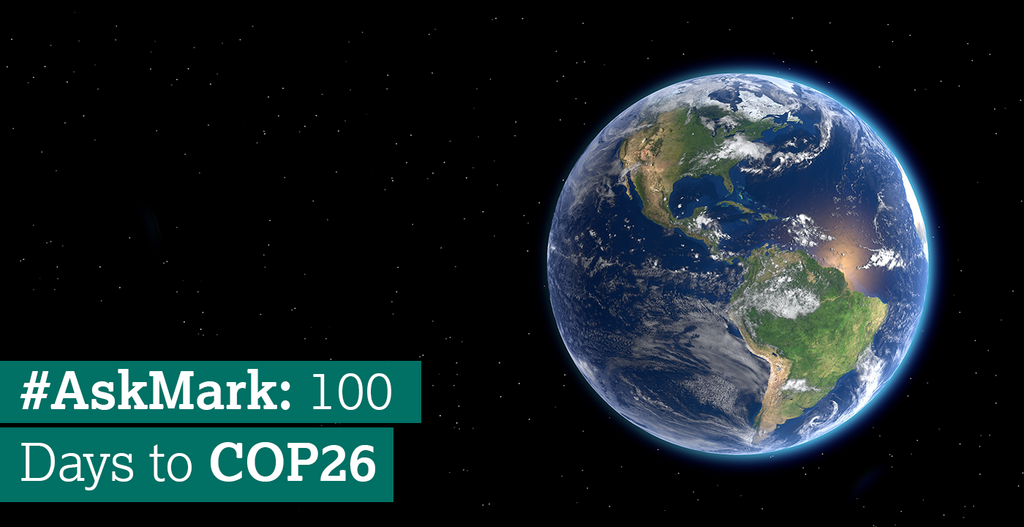#Ask Mark: 100 Days to COP26

As the excitement and anticipation is building for COP26 which is exactly 100 days away, I feel there is renewed enthusiasm and momentum around international climate action and what this significant event can potentially deliver. There is an appetite for progress, we as a nation are more invested in the environment, we are far more aware of the seriousness of climate change and the impact we as individuals have on the planet.
Efforts to set us all back on the right path will be in the spotlight this November, when Glasgow hosts COP 26, the UN’s Climate Change conference. It will be the most significant inter-governmental meeting about climate change since Paris in 2015, and the largest-ever conference held in the UK, with over 30,000 attendees. This giant undertaking is all very impressive, and demonstrates a global willingness to engage with the subject. However, we need more than empty words. The truth is we have to half carbon emissions by 2030, and then hit zero net emissions by 2050. There can be no doubt about the huge scale of this challenge and the enormous structural change that is required. In the history of humanity, we’ve never innovated at the speed we now need to.
As I see it, saving the planet requires a mix of education, collaboration and encouragement, three core pillars that we as a brand stand by .
Pillar 1: Education
Firstly, it’s about education, the kids of today are our future and the planet’s future. The role of education is crucial to help people understand and address the impact of climate change. The youth is becoming increasingly committed to the fight against global warming and education is a key step to addressing these issues. I believe the education system needs to change; make climate change issues more visible and understandable. Immersing kids from an early age in nature is a crucial part of sustainability education, it helps them to develop an appreciation for the Earth. For older groups, it’s integrating climate change into as many subjects as possible. Our education system should highlight and talk about natural resources, circular economy, natural capital, all of which can help overcome the environmental challenges we are currently experiencing. Make watching Breaking Boundaries by Sir David Attenborough and Johan Rockstrom compulsory for every teacher and then make them watch it again with their students.
Pillar 2: Collaboration
The second step is collaboration, we are in THE ‘Climate Decade’. The most important decade humanity has ever faced and we need to effect serious change on a large scale from Governments right down to local communities. This has to be a collaborative effort; we all have to play our part in cutting carbon emissions and promote a green recovery. With our initiative Collaborate-to-Zero which is a series of live podcast interviews with sustainable leaders and inspirers from key sectors. Our aim is to create a book with their top tips to share with delegates ahead of COP26 to encourage other disruptive entrepreneurial individuals, businesses, organisations to ultimately transform at an unprecedented scale and speed. We have a unique opportunity to build back a better, fairer ‘Net Zero’ economy. Every business must be ready to meet that challenge to give us a shot at a better future.
Pillar 3: Encouragement
And lastly, encouragement; how do we encourage on a large scale? We need to invest more from a research and development perspective; governments, private equity and financial institutions must move away from their current focus on making short-term investments in favour of longer-term sustainable ones. Take for instance Zac Goldsmith's urge for change, he is calling for the government to introduce a range of incentives such as stamp duty rebates for homes participating in the green deal, and reduced VAT on materials used to retrofit homes. It’s these innovative ideas and incentives that will give people the encouragement to do the right thing.
Encouraging a different approach is what we have tried to do at Delphis Eco, taking decisions about our business and how it operates to create genuine structural change in our industry. For example, our perseverance with developing a 100% recycled and recyclable plastic bottle has been the right thing to do, though it has cost us financially. Over time, we hope to make it impossible for competitors to not do the same, since consumers will not tolerate it, and as a result innovation and scale will bring down the cost of such products. And finally, SME’s employ over 80% of the UK’s workforce, yet it is these smaller firms that often find it impossible to access the lending they need to invest in the new equipment and processes that would power more efficient and cleaner production. These SMEs are the lifeblood of the economy, so allowing each to work in a greener way would have a huge culminative effect for good.
We are so excited to see what the next 100 days brings and to be in Glasgow for COP26.

Leave a comment